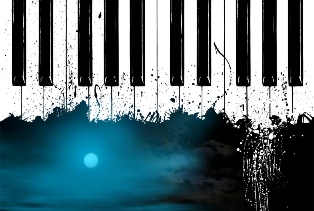
Cassidy Mines Pianistic Gold from Hollywood's "Golden Age"
Kentucky Symphony Orchestra music director James R. Cassidy
needs a fedora.

A virtual Indiana Jones when it comes to programming concerts, he did it again Saturday night (May 12) at Florence Baptist Church at Mt. Zion.
The object of his digs this time was “Cinematic Piano,” a concert featuring piano pieces composed for films during Hollywood's “golden age” (1940-60). Nine composers, four pianists and hours of scouring libraries, studio inventories and other primary and secondary sources went into planning for the concert. Pianists Steve Hinnenkamp, Marcus Küchle, Edward Neeman and Scot Woolley shared the program, performing concert pieces composed for films by Richard Addinsell, Hubert Bath, Bernard Herrmann, Miklós Rósza and Leith Stevens, as well as theme and soundtrack music by Ernest Gold and Charles Williams. To give them context, clips of the films were projected onto a screen behind the orchestra in the sanctuary of the church.
It was a black-and-white journey into the past. The earliest clip was from “Dangerous Moonlight” (also known as “Suicide Squadron”) from 1941, the latest “Exodus” and “The Apartment” from 1960. Many of them involve classical music in ways unheard of today, with plots centering on composers, pianists and music itself. In “Night Song” (1947), pianist Arthur Rubenstein performs Stevens’ one-movement Piano Concerto in C Minor, with Eugene Ormandy conducting the New York Philharmonic. Both men had speaking roles in the film, which starred Dana Andrews as a blind composer whose work is premiered at Carnegie Hall.
Cassidy opened with pianist/composer Hinnenkamp in perhaps the best known piece written for film, Addinsell’s “Warsaw Concerto” from “Dangerous Moonlight” (about a Polish pianist serving as a combat pilot in World War II). According to program annotator Tom Consolo, the film’s producers tried to engage composer Sergei Rachmaninoff and, failing that, asked Addinsell to write a piece in Rachmaninoff’s style. Addinsell did, filling it with drama and romance, which Hinnenkamp conveyed beautifully.
Woolley (local pianist, arranger and musical man-for-all-seasons) took on Franz Waxman and his “Rhapsody for Piano and Orchestra” from Alfred Hitchcock’s 1947 courtroom drama “The Parradine Case.” Cut from the same romantic cloth as the Addinsell, it featured sensitive playing by Woolley and some lovely solos by KSO winds and strings. Küchle (director of artistic operations for Cincinnati Opera) brought a nimble touch to Bath’s “Cornish Rhapsody” from “Love Story” (1944), a tearjerker about a dying pianist, featuring another score with the hyper-romantic “Hollywood sound.”
Making his KSO debut in Stevens’ Piano Concerto in C Minor was Edward Neeman (stepping in for Michael Chertock, who was asked to open the Boston Pops season May 9 with Keith Lockhart and Bernadette Peters). An artist diploma student at the University of Cincinnati College-Conservatory of Music, Neeman, 27, made an outstanding impression, performing with superb focus and expression. He returned later for Hermann’s “Concerto Macabre” from the 1945 film noir “Hangover Square,” wherein a composer/murderer plays his own concerto (to the death) in a burning building. Here again, Neeman rendered the music with a sure feel for its emotional content. Both pieces were performed from memory.
Rósza’s “Spellbound” Concerto was composed using parts of his score for the 1945 Hitchcock film. Eerie-sounding (fully scored, it utilizes the theremin, an electronic instrument often heard in sci-fi movies), it had a real urgency about it, which Küchle fully conveyed, backed with color and drama by Cassidy and the KSO.
Cassidy lightened the evening by outlining his lengthy quest for Wildman’s “Swedish Rhapsody,” from the 1951 film “Gypsy Fury” about dark dealings in 14th-century Sweden. (For one thing, Wildman’s real name was Willy Mattes, Cassidy said.) After a diligent search, all he could come up with was a piano arrangement, which he gave to Woolley, who painstakingly extracted orchestral parts and reconstructed the piano part, all at the last minute.
To demonstrate the fruits of their efforts, Woolley coolly took his seat at the Steinway and played the piece, another document from the post-war era of Hollywood romance.
Cassidy rounded out the program with theme music from “The Apartment” and “Exodus” (both 1960), as arranged and popularized by the chart-busting piano duo Ferrante and Teicher. Küchle and Woolley essayed the former, Neeman and Hinnenkamp the latter, both with great panache.
Playing a starring role throughout the concert was the 47-piece KSO, a free lance ensemble that just gets better and better. Particularly impressive were the KSO strings, especially the violins, who in true heart-rending, Hollywood fashion, were frequently called upon to soar into their highest register.
The concert brought to a close the KSO’s 20th anniversary season, a milestone in its distinguished history of innovation, exploration and knockout, one-of-a-kind programs. The orchestra opens its annual Devou Park Series with a World Choir Games Friendship Concert, featuring visiting choirs from Norway and Ukraine, at 7:30 p.m. July 7 in the Devou Park amphitheater. (To remind listeners of the upcoming event, WCG mascots Whirl and Twirl were at the door for Saturday’s concert.)
The World Choir Games take place July 4-14 in Cincinnati, with nearly 400 choirs from 50 countries registered to participate. Information at www.2012worldchoirgames.com